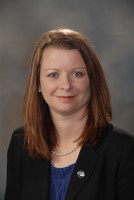Accepting Responsibility for Our Children and Our Schools

By Christy Watson
Notoriously bad. Often unsafe. Those children. Those schools.
Seeing those phrases on paper last week from a group tied to the State Chamber of Oklahoma to justify school vouchers left me wondering whether to be angry or cry. I opted for both.
Can we have a conversation about OUR schools and OUR children without using shameful — not to mention inaccurate — labels?
Words matter. We’re too at ease with the idea that we can call schools failing and not imply that the children and adults inside them are failures. The academic distinction is far removed from reality. And it’s even worse when adults who have power, influence and means suggest that abandoning OUR schools is a solution to helping OUR vulnerable children.
I’ve been in the homes of some of our city’s most impoverished families. Some of their lives are chaotic and difficult for me to relate to, but they are doing the best they can with the information and resources they have. They are fighting huge personal battles. Families know school is important but its importance is relative to other challenges — keeping the lights on and food on the table.
My seventh-grade daughter has a cousin of the same age in Kansas. To date, Kansas has invested about $24,000 more in her education than Oklahoma has in my daughter. That’s appalling.
But the children who suffer most from that sort of gap are those who most need help. Talking about producing tomorrow’s workforce is reality for business owners. Let’s also talk about how that only happens if we meet the needs our children have today.
Our children living in difficult circumstances have significant academic disadvantages. Research shows time, social safety nets, extra in-school and after-school support for children and their families, high-quality teachers and high-quality principals can overcome those disadvantages.
Vulnerable children aren’t receiving more of what they need now because for far too long, we’ve focused on shortcuts. I mean “we” in the literal sense. Teachers who work with vulnerable children have long known better, but they may be the only ones immune from shouldering at least a bit of blame.
We all have to own our role. We did this to our children and our schools. Some thought we could test our way to a better future for our children. Others thought a new program — take your pick from the thousands available — would do the trick. Others are guilty of inaction and not listening.
The main advantages private or homeschool offer children are small class size and more individual attention. We can offer that in Oklahoma’s public schools if we stop inventing reasons, throwing out business terms and twisting data to justify less investment.
Our children should be able to get what they need at the public school down the street. If they aren’t, it’s on the adults in our community to get together with educators and do the hard work to change that. Our children and our schools are our responsibility. The only failure I see is a notoriously bad unwillingness to accept that responsibility and do the hard work.
Watson is communications director at the Oklahoma State School Boards Association and the mother of two children in public schools.